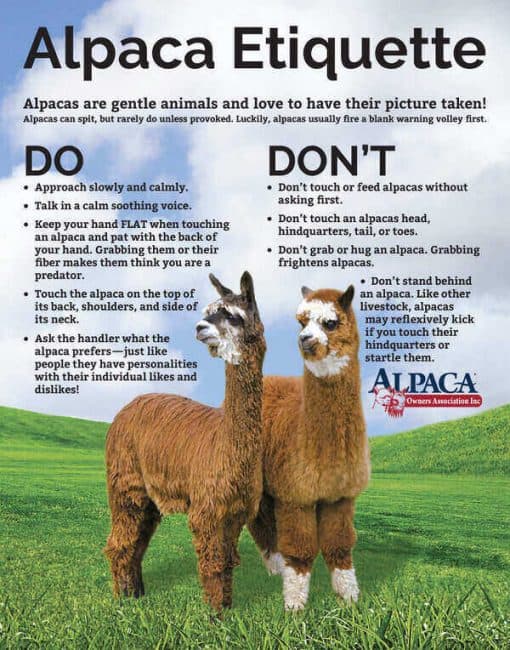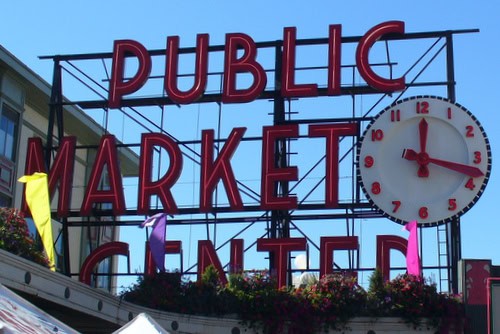Alpaca farms all across the country welcome visitors for National Alpaca Farm Days every September to see and learn about these tranquil and majestic animals. There are several participating farms in Western Washington State.
About the Alpaca Owners Association
Located in Lincoln, Nebraska, the not-for-profit Alpaca Owners Association, Inc. (AOA) is the world’s largest alpaca association with around 4,000 members and over 270,000 alpacas in its registry database. Created in 2014, AOA serves it members to facilitate their success within the alpaca industry, as well as to foster a sustainable North American alpaca industry with high ethical principles for alpaca owners, alpaca breeders, and those who design, produce, and sell alpaca related products and services.
The AOA represents all facets of the North American alpaca industry. It provides information and education about the operation of sustainable alpaca businesses, helps to market alpaca products, and promotes scientific research to benefit the alpaca industry.
More info about the AOA: https://www.alpacainfo.com/
National Alpaca Farm Days
One of the best ways to fully appreciate the gentle alpaca is to visit them at the farms and ranches. You’ll find that alpaca owners love to talk about their animals and show them off!
During alpaca days, AOA member farms open their doors to the public for tours, demos, and shopping for alpaca products. Activities will vary at individual farms, but listed below are some of the features of National Alpaca Farm Days.
- Learn about alpacas from dedicated owners and breeders
- Meet alpacas up-close and feel the soft alpaca fleece
- Alpacas are gentle animals who love to have their picture taken!
- Tour the farm and see live demonstrations or experience hands-on activities
- Shop for alpaca products
- More info: National Alpaca Farm Days (alpacainfo.com)
About Alpacas
Alpacas are members of the camelid family. You’re probably familiar with the ones with humps; the dromedary camel with one hump (Camelus dromedarius) and the Bactrian camel with two humps (the domesticated Bactrian, C. bactrianus and the wild Bactrian camel C. ferus), which are native to parts of Africa and Asia.
However, there are four other camelids without humps, all indigenous to South America: llamas (Lama glama) and alpacas (Vicugña pacos), which are both domesticated. Still in the wild are guanacos (L. guanacoe) and vicunas (V. vicugna).
People often confuse alpacas with llamas, though they are distinctly different animals. Llamas are twice the weight of the average alpaca, so are often used as pack animals for carrying heavy loads.
The much smaller alpacas typically weigh between 100 to 200 pounds. They have been raised as domestic livestock for thousands of years. These quiet, docile animals are raised primarily for their soft and luxurious fleece. The Alpaca (vicugña pacos) comes in two types: huacaya (pronounced wah‑KI‑ah) and suri (SOO‑ree).
- Huacayas alpacas, the more common type, account for about 90% of all alpacas. Their soft, fluffy cost gives these alpacas a teddy bear-like appearance.
- Suris, on the other hand, grow silky, lustrous fleece that drapes gracefully in beautiful pencil-locks.
Shearing an alpaca produces roughly five to ten pounds of fleece per animal, per year. Unlike sheep’s wool, alpaca fleece contains no lanolin (which can be irritating to some people). This makes it easier to clean before spinning into yarn.
The extremely soft fleece, often compared to cashmere, is desired for its fineness, softness, light-weight, durability, excellent thermal qualities, and luster. Alpaca fleece is highly sought-after by both cottage-industry artists (hand spinners, knitters, weavers, etc.) as well as the commercial fashion industry. In addition to selling the fleece to producers, many alpaca farms operate a retail and/or online store selling alpaca end-products.
Alpaca fleece can be turned into a wide array of products from yarn and apparel to blankets. You can find alpaca wool sweaters, hats, gloves, scarves, and socks. (I bought an alpaca beanie at a market years ago and can attest that the wool is extremely soft (extremely soft), fine, and warm.)
For more information, watch the following YouTube video “Inside the Alpaca Industry” by Alpaca Owners Association, Inc.
Alpaca Farms in Washington State
Please check each farms website for details about visiting during Alpaca Farm Days and other times throughout the year. Some farms have stores selling a variety of llama woven goods and related products in-person as well as online.
(Listed alphabetically by city)
Deer Mountain Alpacas, 12918 150th ST NE, Arlington, WA 98223. A small alpaca farm located in the beautiful hills between Arlington and Granite Falls. Their herd includes Huacaya and Suri with a focus on alpaca fiber. Their farm store has scarves, socks, hats, gloves, sweaters, yarn and wonderful stuffed animals, all made with alpaca.
Kissing Cousins Alpaca Farm, 173 Frogner Road, Chehalis, WA 98532. Farm visits are welcome; please call to schedule.
Sandollar Farms Alpacas & Pyrs, 2001 S. Washington St, Kennewick, WA 99337. Celebrate National Alpaca Farm Days on September 28, 2024 from 10am to 3pm at their annual free fun family event for the community. Family photos with the alpacas, face-painting, food truck and more!
Alpacas from MaRS, 424 153rd Drive SE, Snohomish, WA 98290 celebrates National Alpaca Farm Days and is open to the public September 28-29 2024 from 10:30am to 4:30pm. Come meet the alpacas at this free event!
Lighthouse Alpaca Ranch, 5728 Young Rd NW, Olympia, WA. 98502. The owners have retired but welcome visitors who may be looking to raise alpacas either for pleasure or a business.
La Vida Alpaca and Tahoma Vista Fiber Mill, 15631 159th Ln SE, Yelm, WA 98597. A small fiber processing mill that has been involved in the alpaca industry since 1993. The store luxury yarns, a complete line of knitting tools and supplies, and has items from local farms, including alpaca themed gift items and accessories like scarves, gloves, hats and mittens. Rugs are made onsite in the mill. Visitors are welcome for tours and classes. Open by appointment throughout the year, and on select weekends in the fall.
Find more participating alpaca farms across the country: Alpaca Farms Participating in 2024 NAFD (alpacainfo.com)
But wait, there’s more!
- Ultimate guide to zoos, aquariums & wildlife parks
- Local CSA delivery from farms and other food producers
- Where to find u-pick pumpkin patches and farm stands
- Check out these free attractions around the Puget Sound region
- Find free and cheap things to do every day on the Greater Seattle on the Cheap event calendar.
- Visit the Greater Seattle on the Cheap home page and choose from a menu of free and cheap activities in the Puget Sound region.
Love our cheap ideas? Get our FREE email newsletters. Choose from daily, weekly, and monthly lists. Click here to subscribe.

Alpaca Etiquette by the Alpaca Owners Associatoin (AOA)
Event calendar of free and affordable things to do
Listed below are all types of free and affordable things to do in the next 30 days.
Featured Events are listed first each day, highlighted by a photo. These are unique, popular, or annual events that we or our advertisers don’t want you to overlook.
Find more events and ideas for affordable living at Greater Seattle on the Cheap – Free things to do, cheap fun, discounts and deals in the Seattle-Tacoma metro area
Multiple locations








